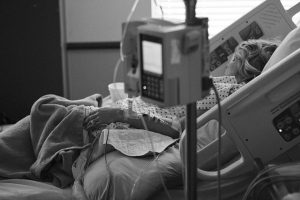
Treatment for schizophrenia has typically involved the prescription of antipsychotic medication since the introduction in the 1950s of first generation antipsychotics such as chlorpromazine and haloperidol. The subsequent development of second generation antipsychotics provided a wider range of drug options including clozapine, risperidone, quetiapine and olanzapine.
Numerous studies have compared the efficacy and safety of both first and second generation antipsychotics. A key meta-analysis from 2013 (blogged about here) has suggested that clozapine is the most effective second generation antipsychotic and quetiapine the least effective (Leucht et al, 2013).
A recent paper (Vanasse et al, 2016) investigated whether observational ‘real-world’ studies can contribute complementary information on the efficacy and safety of antipsychotics. The authors also hoped to address methodological criticisms of previous observational studies (De Hert et al, 2010) by designing a study that included all patients in a defined population who are ‘new-users’ of antipsychotic medication. Their methodology also included participants who are typically excluded from research due to their age and comorbidities.

In this study, Canadian public health insurance records were used to assess the effectiveness of antipsychotics.
Methods
The authors conducted a retrospective cohort study based in Quebec, Canada using administrative data from:
- Régie de l’assurance maladie du Québec (public health insurance plan)
- Institut de la statistique du Québec (recording the dates and causes of death)
The study cohort included:
- Adults starting at least one antipsychotic drug who hadn’t received medication during the previous six months
- Prior diagnosis of schizophrenia or schizoaffective disorder
- People receiving treatment between January 1998 and December 2005.
The study excluded individuals not covered by a public drug insurance plan and pregnant women.
The drugs administered included olanzapine, risperidone, quetiapine, clozapine, first generation antipsychotics and multiple-antipsychotics.
No differentiation was made between oral and long-lasting injectable, and dosage was not considered until the sensitivity analysis.
Effectiveness was measured by the following primary outcomes:
- Mental health events including suicide, hospitalisation or an emergency department (ED) visit
- Physical health events including death, hospitalisation or ED visit.
The secondary outcomes measured included:
- Antipsychotic discontinuation (considered a sign of inefficiency or intolerability)
- Switching/add-on antipsychotic treatment
- Combination of the above.
Results
In total, 18,869 adults were included in this study and received the following drugs:
| Antipsychotic | % of cohort | Median daily dose |
| Olanzapine | 29.3% | 10mg |
| Risperidone | 26.4% | 2mg |
| Quetiapine | 6.0% | 100mg |
| Clozapine | 1.7% | 400mg |
| First generation antipsychotic | 28.5% | – |
| Multiple-treatment | 8.0% | – |
Results recorded during the follow-up period included:
- 50.4% of participants experienced a mental health event
- 35.3% were hospitalised for a mental disorder and 45.5% consulted an ED for a mental health disorder
- 55.8% experienced a physical health event
- 19.9% were hospitalised for a non-mental health disorder and 52.3% consulted an ED for a non-mental health disorder
- 67.7% switched/added-on or discontinued their antipsychotic treatment
- 939 participants died during the study (cause of death was recorded as suicide for 114 people).
When compared to first generation antipsychotics, the following risks for mental or physical health events were identified:
- Those using quetiapine or no antipsychotics were at highest risk of experiencing a health event
- Clozapine and olanzapine resulted in slightly fewer health events than first generation antipsychotics
- Risperidone didn’t result in a significantly different number of events compared to first generation antipsychotics
- Clozapine was associated with the smallest risk of discontinuation, and quetiapine the least chance of switching or adding another antipsychotic
- First generation antipsychotics were associated with the highest risk of discontinuation or switching
- Clozapine resulted in fewer events for people aged 35 and under.
Conclusion
The authors concluded that:
The main finding of this study was the poorer performance of quetiapine and a slightly better performance of clozapine regarding effectiveness when compared to first generation antipsychotics. Additionally, not taking any antipsychotics at event time was also associated with an increased risk of health events.
Their confidence in explaining this conclusion was, however, limited:
Despite clear results, we cannot tell whether the poorer performance of quetiapine is due to the product itself, to suboptimal prescription, or to residual bias (e.g. being unable to control for indication bias – the tendency for the arrival of a new drug is to use it in the most severe cases).
Strengths and limitations
This conclusion reflects the problems associated with a retrospective observational study and highlights that factors leading to potential bias could not be considered when the data being analysed in this study was collected. In this instance, the results were likely to be influenced by the quality of the data recorded on the administrative databases (information bias) and the prescription choices made by clinicians.
Similarly, limited information is provided on the severity of the symptoms of schizophrenia and other illnesses experienced by participants. This arguably weakens any correlation between the efficacy and safety of the medication prescribed and the frequency of hospitalisation for mental or physical health events.
While the results reflect those found in previous studies, the authors acknowledge that ‘our results could thus theoretically be partly biased by confounding factors…’
Study strengths noted include the large number of participants, the inclusion of typically underrepresented people with comorbidities, and its ‘new-user’ design.
Only the overall numbers for suicide and death by other causes are provided, and not for individual drugs. The authors argue that the numbers are too small to be significant; however, this information is vital and should have been included.
Implications
While it’s difficult to judge the efficacy and safety of antipsychotics using this methodology, the data collated does provide complementary information on the use of these drugs and valuable insight into the lives of people with schizophrenia.
It would be particularly interesting to compare the data on hospitalisations, financial status, substance misuse, suicide, diabetes etc. with the healthy population of Quebec to illustrate the ‘real-world’ impact of schizophrenia.
Links
Primary paper
Vanasse A, Blais L, Courteau J, Cohen AA, Roberge P, Larouche A, Grignon S, Fleury M-J,Lesage A, Demers M-F, Roy M-A, Carrier J-D, Delorme A. Comparative effectiveness and safety of antipsychotic drugs in schizophrenia treatment: a real-world observational study. Acta Psychiatr Scand 2016: 134: 374–384 [PubMed abstract]
Other references
Leucht S, Ciprani A, Spineli L, et al. Comparative efficacy and tolerability of 15 antipsychotic drugs in schizophrenia: a multiple-treatment meta-analysis. Lancet 2013: 382: 951-962 [PubMed abstract]
De Hert M, Correll CU, Cohen D. Do antipsychotic medications reduce or increase mortality in schizophrenia? A critical appraisal of the FIN-11 study. Schizophrenia Research 2010: 117: 68-74 [PubMed abstract]
Photo credits
Vic CC BY 2.0



agree with @traceystweets01 @Mental_Elf ‘real-world’ studies should include ‘real-world’ substance use otherwise they’re artificial !
@Mental_Elf Did they include the views of the people who had to take the medication and their experience of it and their outcomes/ values?
Antipsychotic efficacy measured by real-world observational study https://t.co/6jZsJroles
Today @traceystweets01 retrospective cohort study comparing efficacy & safety of #antipsychotics for #schizophrenia… https://t.co/4zdTYQ9x37
Main results: pior efficacy for all, we need better drugs!
Quetiapine is used for all and everything. Think to much, don’t sleep, a bit uneasy. Have you tried quetiapine?
sorry, poor efficacy
‘Antipsychotic efficacy measured by real-world observational study’ @traceystweets01 for @Mental_Elf https://t.co/ALzL97K0Gz
Antipsychotic efficacy measured by real-world observational study
https://t.co/HUw6MyZmUF https://t.co/Ilavdv3ROu
Antipsychotic efficacy measured by real-world observational study @Mental_Elf looks at a retrospective cohort study https://t.co/0o7V7gt76S
Antipsychotic efficacy measured by real-world observational study https://t.co/VBeRFE2xlG via @sharethis
RT @Mental_Elf: Antipsychotic efficacy measured by real-world observational study
https://t.co/9xiNCKQx5s https://t.co/MsMfQj4KuG
192 people have completed our survey!!
We hope to get to 250 before the survey closes in 3 weeks.
Can you help?
If you’ve had experiences of
#Hallucinations
#Delusions
#Paranoia
#unusualbeliefs
YOU COULD DO OUR SURVEY!!
Click here: https://www.psych-ssl.manchester.ac.uk/survey/clin
PRIZE DRAW to say thanks!!
Any thoughts on the development of this study from 2017as conducted by Tiihonen J, Mittendorfer-Rutz E, Majak M, et al.? (They Real-World Effectiveness of Antipsychotic Treatments in a Nationwide Cohort of 29823 Patients With Schizophrenia)